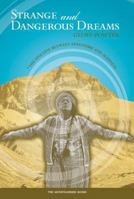Swimming with Crocodiles
Select Format
Select Condition 
You Might Also Enjoy
Book Overview
Customer Reviews
Rated 5 starsA modern day Lewis & Clark tale
Chaffey tells a beautiful story of his outback adventure in the spirit of "Undaunted Courage" (Ambrose) and "In the Heart of the Sea" (Philbrick). In the era of satellite phones and GPS it requires equal parts daring and stupidity to put yourself in Chaffey's position miles from nowhere with only the determination to survive as your safety net. Chaffey's descriptions of the land, plants and animals let you know he never really...
0Report
Rated 5 starsExcellent Telling Of An Outback Adventure
I thoroughly enjoyed this book. I already had a strong interest in Australia at the time I bought this book...having visited the Northern Territory of Australia less than a year ago. This is an excellent book, retelling the adventures and travels of the author as he experiences the beauty and dangers of the Kimberley region. I recommend this book for anyone interested in wilderness adventure.
0Report
Rated 5 starsAwesome story of adventure.
Awesome book on adventure and living life. The story brings the reader into the moment, and is very well written. Will Chaffey's story, should be a manual on how to have an adventure and make a life time of memories for any age of adventurer. Jeff who is Will's traveling partner, really brings the story together. With Jeff's extensive knowledge of Australia, reptiles and native plants, you feel as if you are being professionally...
0Report
Rated 5 starsGreat story, well told
I enjoyed reading this immensely, and highly recommend it. Chaffey's book is a successful combination of an unpretentious coming-of-age story and a great adventure. We follow Chaffey, a young man at loose ends, with an unhappily concluded New England prep-school education, who lands in Australia hoping to find purpose in life and some fun along the way. After months of working odd jobs he winds up walking with one companion...
0Report
Rated 5 starsA wild ride....
The perfect escape! This story is so adventuresome, so surreal you almost question the likelihood, however the authors genuine tone and natural, easy going writing style add rugged authenticity to the tale. An excellent chance to escape the ordinary and experience a fantastic adventure in outback Australia.
0Report









































